Podcast Topic: Diet & Nutrition
Podcast Topic: Diet & Nutrition
 E233: Grocery and meal insight from the Baby’s First Years project
E233: Grocery and meal insight from the Baby’s First Years project
March 28, 2024
A growing number of research studies show that the cognitive and brain development of low-income children differs from that of children in higher income families. For any family, that is a concerning statement. Today’s podcast features a project called Baby’s First Years, a multi-year effort to test the connections between poverty reduction and brain development among very young children. Here to talk about what the study has revealed so far is Dr. Lisa Gennetian from Duke University’s Sanford School of Public Policy, and Dr. Sarah Halpern-Meekin from the La Follette School of Public Affairs at the University of Wisconsin, Madison.
Related podcasts: Child Development & Nutrition | Diet & Nutrition | Food Insecurity | Social Safety Net & Food |
 E230: Results from a national consumer attitudes survey on dollar stores
E230: Results from a national consumer attitudes survey on dollar stores
February 22, 2024
Dollar stores are the fastest growing food retailer in the United States, both by sheer number of stores and consumer food purchases. Just two corporations, Dollar General and Dollar Tree, which also owns Family Dollar, operate more than 35,000 stores across the country. However, a growing body of research reveals that dollar stores offer limited healthy food options. Dollar stores shape the food environments of communities, especially in the South and Midwest regions and communities in rural areas with substantial shares of Black and Latin people and households with limited financial resources. What do we know about the impact dollar stores have on these communities and the overall wellbeing of community members? The Center for Science in the Public Interest conducted a national survey to understand how people perceive and actually use dollar stores. Today we will talk with lead author of this study, Senior Policy Scientist Sara John.
Related podcasts: Diet & Nutrition | Food Industry Behavior & Marketing | Food Insecurity |
 E223: Food Policy Lessons from Removing Trans Fats from our Diet
E223: Food Policy Lessons from Removing Trans Fats from our Diet
December 20, 2023
In August of 2023, the Food and Drug Administration issued something known as a direct final rule, disregarded trans fats in the food supply. Consumers won’t notice changes as the rule just finalizes FDA’s 2015 ruling that partially hydrogenated oils – trans fats – no longer had “GRAS status.” GRAS stands for generally regarded as safe. We cover this issue today because this trans fat ban was the product of lots of work by a key group of scientists, the advocacy community, and others. The anatomy of this process can teach us a lot about harnessing scientific discovery for social and policy change. At the center of all this is today’s guest, Dr. Walter Willett. Walter Willett is one of the world’s leading nutrition researchers. He is professor of epidemiology and nutrition at the Harvard T.H. Chan School of Public Health, and for many years served as chair of its Department of Nutrition. He’s published extensively, been elected to the National Academy of Medicine, and it turns out, is the world’s most cited nutrition researcher.
Related podcasts: Advocacy & Food | Diet & Nutrition | Food Industry Behavior & Marketing | Food Policy | Food Safety & Food Defense |
 E221: Understanding Poverty, Wellbeing, and Food Security for US Children
E221: Understanding Poverty, Wellbeing, and Food Security for US Children
November 30, 2023
As the parent of a 12-year-old child, I know that raising a child is one of the most profound and rewarding experiences of a person’s life. It is also shockingly expensive. The high cost of child rearing is particularly difficult for families with limited resources. To help us think through this issue, it is my great pleasure to welcome a colleague here at Duke: Dr. Christina Gibson-Davis, Professor of Public Policy. Christina studies economic inequality, and particularly how it affects families with children.
Related podcasts: Child Development & Nutrition | Diet & Nutrition | Equity, Race & Food Justice | Food Insecurity | Food Policy | School Meals | Social Safety Net & Food |
 E220: Largest study to date on Produce Prescription Program health impacts
E220: Largest study to date on Produce Prescription Program health impacts
November 6, 2023
Diet-related disease such as cardiovascular disease and diabetes create a crushing burden on individuals, families, and the healthcare system in the United States. However, Produce Prescription Programs where medical professionals prescribe fruits and vegetables and health insurers pay, promise to improve nutrition and health. Today we will talk with Dr. Kurt Hager from the University of Massachusetts Chan Medical School and lead author of the largest assessment of Produce Prescription Programs to date.
Related podcasts: Child Development & Nutrition | Childhood Obesity | Diet & Nutrition | Food Insecurity | Social Safety Net & Food |
 E217: When babies inherit Mom’s trauma-affected gut microbiome
E217: When babies inherit Mom’s trauma-affected gut microbiome
October 12, 2023
A diversity of bacteria and microorganisms making up the gut microbiome supports both our physical and our mental health. Research has shown that stress and trauma can negatively impact the microbiome. But a recent study took that finding to a new level. This was a study published in the Proceedings of the National Academy of Sciences. Scientists now see inflammation-related microbiomes in babies born to women who experienced mistreatment or adversity during their own childhood. These microbiomes predispose children to physical and mental health problems. We’ll talk today with the co-author of that paper, Fran Querdasi, from the University of California, Los Angeles.
Related podcasts: Child Development & Nutrition | Diet & Nutrition | Food, Psychology & Neuroscience | Microbiome |
 E216: Who are the biggest beef eaters of all?
E216: Who are the biggest beef eaters of all?
October 5, 2023
I read a study recently featuring a term I had not heard or seen before: “disproportionate beef eaters.” The study was done by Dr. Amelia Willits-Smith, Diego Rose and colleagues at Tulane University. So, who are such beef eaters and how are their consumption patterns associated with environment and climate change? Today we’re joined by one of the authors of that study, Dr. Diego Rose, who is a professor and nutrition program director in the School of Public Health at Tulane.
Related podcasts: Climate Change, Environment & Food | Diet & Nutrition |
 E214: Championing MyPlate – USDA’s Director of Food & Nutrition Service Caree Cotwright
E214: Championing MyPlate – USDA’s Director of Food & Nutrition Service Caree Cotwright
September 13, 2023
Our guest today is Dr. Caree Cotwright, director of Nutrition Security and Health Equity at the Food and Nutrition Service at the US Department of Agriculture. Dr. Cotwright is leading a USDA-wide approach to advancing food and nutrition security in the United States. Part of her responsibility includes the charge from Secretary of Agriculture Tom Vilsack to make MyPlate a household name. MyPlate is the official visual reminder of the US government to make healthy food choices from each of the five food groups. Now, this turns out to be a tall but important order. About a quarter of US adults have heard of MyPlate, according to a recent survey.
Related podcasts: Child Development & Nutrition | Childhood Obesity | Diet & Nutrition | Food Policy |
 E210: Clinical Trial Evidence: Metabolic Effect of Sweeteners
E210: Clinical Trial Evidence: Metabolic Effect of Sweeteners
July 24, 2023
Sugar replacements, known generally as artificial sweeteners or non-nutritive sweeteners, have been in the news a lot. Rising concerns exist about safety and the effects of the sweeteners on many key features of health, including the microbiome. We need the help of talented scientists to sort through this complex web of information. Today’s guest, Professor Eran Elinav, has done some of the seminal research in this area. He’s an expert on systems immunology at the Weizmann Institute of Science in Israel.
Related podcasts: Diet & Nutrition | Food Policy | Food Safety & Food Defense | Microbiome | Zero Calorie Sweeteners |
 E209: Microbiome Research and a Vision of Precision Medicine
E209: Microbiome Research and a Vision of Precision Medicine
July 13, 2023
The microbiome is fascinating and how diet affects it is something we all want to know. The work of today’s guest, Dr. Abigail Johnson, tells us a lot. She’s on the faculty and the School of Public Health at the University of Minnesota and is an expert on diet and the microbiome and their impact on health and disease.
Related podcasts: Diet & Nutrition | Food, Psychology & Neuroscience | Microbiome |

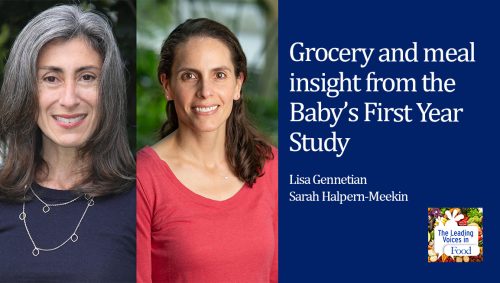 E233: Grocery and meal insight from the Baby’s First Years project
E233: Grocery and meal insight from the Baby’s First Years project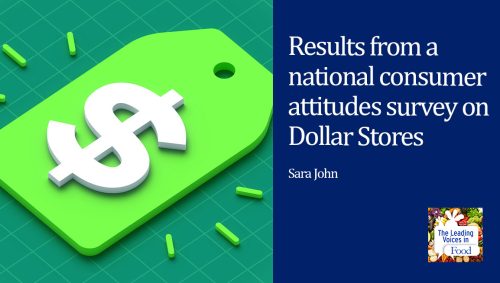 E230: Results from a national consumer attitudes survey on dollar stores
E230: Results from a national consumer attitudes survey on dollar stores E223: Food Policy Lessons from Removing Trans Fats from our Diet
E223: Food Policy Lessons from Removing Trans Fats from our Diet E221: Understanding Poverty, Wellbeing, and Food Security for US Children
E221: Understanding Poverty, Wellbeing, and Food Security for US Children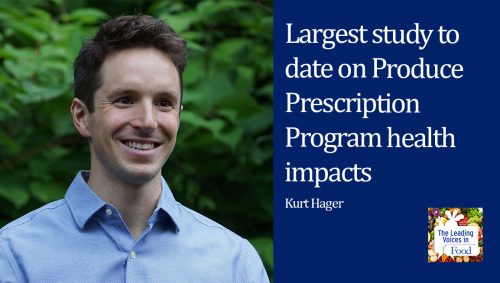 E220: Largest study to date on Produce Prescription Program health impacts
E220: Largest study to date on Produce Prescription Program health impacts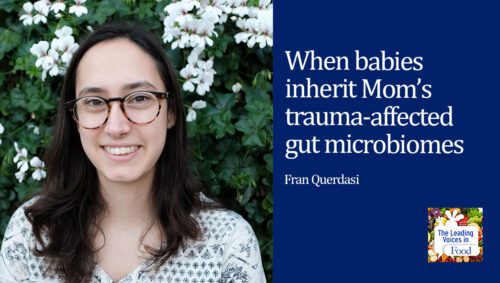 E217: When babies inherit Mom’s trauma-affected gut microbiome
E217: When babies inherit Mom’s trauma-affected gut microbiome E216: Who are the biggest beef eaters of all?
E216: Who are the biggest beef eaters of all?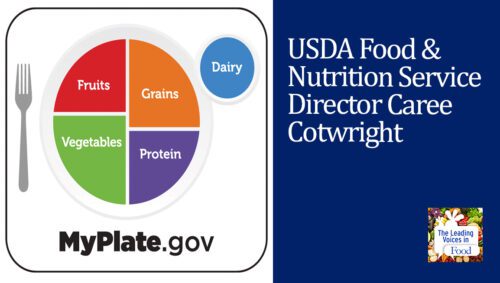 E214: Championing MyPlate – USDA’s Director of Food & Nutrition Service Caree Cotwright
E214: Championing MyPlate – USDA’s Director of Food & Nutrition Service Caree Cotwright E210: Clinical Trial Evidence: Metabolic Effect of Sweeteners
E210: Clinical Trial Evidence: Metabolic Effect of Sweeteners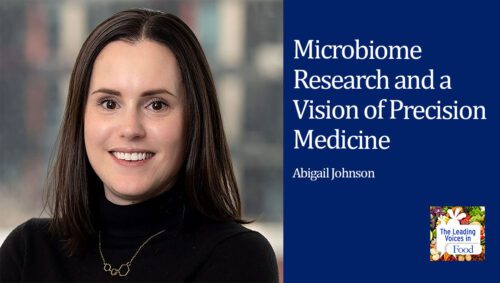 E209: Microbiome Research and a Vision of Precision Medicine
E209: Microbiome Research and a Vision of Precision Medicine